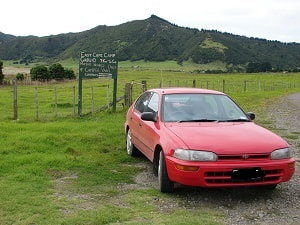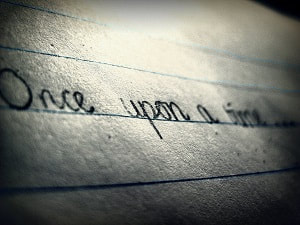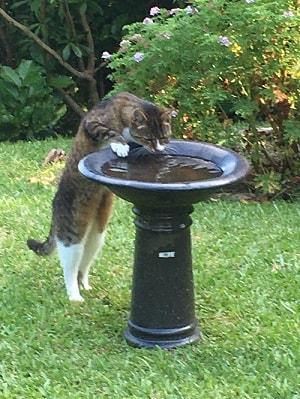 When you're thinking about your life, think about your car. We often take our cars for granted. They get us from A to B, sure enough, and we spend inestimable hours in them over a lifetime: strapped into car seats as youngsters, learning to drive in our teens with a white-knuckled parent or pale-faced driving instructor beside us, and then when we're old, the moment we're told 'you can't drive any more' - how does that loss of independence feel? Our cars, trucks, motorbikes, bicycles - any form of daily transportation we use - play important roles in our life stories. Think about the first car you ever owned - so proud were you! Maybe your parents helped you buy it, or they gave it to you, or you saved every penny until you could afford to make this four-wheeled fantasy a reality. Did that first car have a peculiar characteristic? Did it always have a pull to the left, in spite of multiple visits for alignment? Driving gave you independence. Having a car enabled you to get out into the world, go places, see things, meet people, get to work, hold down a job, take your girlfriend out - maybe the one who eventually became your wife? While that car gave you freedom and joy, it also came with cost, trials and tribulations: you had to buy petrol to make it go; when it broke down, as they inevitably do and often at the worst possible moment, did you have the money to foot the bill? 'The adventure begins when something goes wrong' and nothing could be truer when a car breaks down: were you on a deserted country back road after midnight when the tyre went flat and you had no spare, or perhaps on a hot desert road and the radiator blew and you had no water to fill it? Maybe you had an accident in your car - a minor fender-bender or one that changed your life - and maybe someone else's - irrevocably. I've always been fond of my cars. They've all had different personalities and quirks, particularly the used ones that came with a ready-made personality shaped by someone else - sometimes you get along with that persona, sometimes not. The first car I owned was a used Datsun 510 called Chickadee that I bought in Seattle and drove all the way to Fernandina Beach, Florida - I've written about that brave little adventurer in a previous blog. I've had only two new cars in my life that came to me with that new-car smell and shine. One was a little pickup truck that I never formed much of an attachment for (we were living in the country at the time and bought it because it was handy to have), and the other is my red Toyota Corolla that I still own, one that's been with me since about 1995 or so. I cannot bear to part with it. I love it so. We've had plenty of adventures, Car and I, have traveled many of New Zealand's most hair-raising roads together, kicking up dust and flying over potholes and flood-water-gouged ditches. I've lifted that hatchback to load in firewood, boxes, building materials, people, my drums and heaven knows what-all else. It has about 280,000km on the clock now, is treated to an annual service each year, has a blow-your-ears-out sound system and doesn't give me a lick of trouble. It gets me home late at night in a way that is gallant and noble: 'I will get you home safely Miss Jane, don't you worry.' It is never petulant - it starts up every time. Like a genteel older person, it keeps on going despite the aches and pains its 280,000 kms no doubt cause. It never kicks up rough and complains. I could write a book about my experiences with cars - the ones I grew up with in our family, the ones I have owned, the places these vehicles have taken me. What can you say about your wheeled pride and joy?
0 Comments
 'Once upon a time ...' Stories read to us in childhood often began this way and when I heard those words, I was filled with a delightful anticipation of what was to come, snuggling down even closer to Mom as she read from the picture book before my bedtime. Even now, I find myself going, 'Yes? OK? What is going to happen?' Beginnings are everything in our stories. They hook the reader in, entice us to read on, we want to find out what happens. Even that classic clanger, 'It was a dark and stormy night' does the trick - what happened on that dark and horrid night? I'll often pick up a book in the shop and read the first line. If it doesn't grab me, I'll put it down - is that fair to the writer? Probably not - but for me, as a reader, I know what I want and if I don't see it on the first page, I'll probably move on because there are so many other books out there ... I've written about 'famous first lines' before and if you Google search, you can find lists of them. Here's one from Iain M. Banks (The Crow Road 1992): 'It was the day my grandmother exploded.' Wow - I'd like to know whether she literally combusted out on the front porch in her rocking chair or did she blow up with anger and rage, red-faced with clenched fists. Every first draft has a first line, and sometimes that first line will make it through to the final version. I began my book The Pink Party with, 'The invitations to Colleen's Pink Party said, 'Wear your best pink' so even the men have dressed up.' That sentence stayed as the first one right through to the published book. Sometimes the beginning may occur to us when we're working on the middle, or the end, of our story. While writing my book about Mom, I was typing away on the middle and thought, 'This sentence would make a great beginning' - that's the fabulous thing about cut and paste. It's important to be 'organic' with beginnings and first lines - often they will find their own way, present themselves without you having to structure them or force them into being. That first line may surprise you. It could be an overheard snippet of dialogue, a newspaper headline, and it can inspire a whole story or book. I was sitting with a friend some years ago; she was ill in Hospice care, full of pain medications, drifting in and out of sleep. Suddenly, she opened her eyes and said with clarity and surprising strength, 'I can't hear the waves tonite.' That became the first line in a short story I wrote. So when you're starting out with a story, don't let coming up with a ripper first line trip you up - don't think you can't start writing without one because you can and of course as we've said, that first line might even be the inspiration for your story in the first place. (My editor would say, 'You've used 'first' too many times here.')  My cat Betsy has water bowls positioned all around the house so she doesn't have to go far, or exert herself too much, to get a drink on these hot summer days. She's going on 19 now so I try to make things easy for her. In spite of the convenience, Betsy likes drinking from the bird bath on the front lawn. It's a real stretch for her. She has to stand on her tip-toes, battling her arthritis, to get a drink. Writing is a bit like that. It's easy to go round and take from the usual sources, harder to make a stretch and go for something new, different, delicious, exciting - something that will make your arthritic creative joints hurt but the results will be worth it. What are your writing plans for 2019? Do you think you would stretch your writing legs and try something new and different? This year will you write in a new genre that challenges you? Travel writing? Crime? Romance? Perhaps you will commit to writing that memoir for the children, or think about putting together a collection of poems, insights into the delights of summer at the beach or a small cabin by the lake... Whatever it may be, think about stretching your legs a bit. Challenge yourself. Don't go for the water bowls within easy reach. Stand on your tiptoes, put your hands up on that birdbath and see what the view is like from up there. |
Archives
January 2024
|